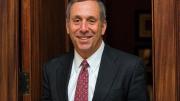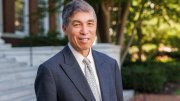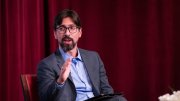In a flurry of activity just before Harvard begins its extended winter recess December 21, President Lawrence S. Bacow wrote a letter to President-elect Joseph R. Biden Jr. urging U.S. policies more welcoming to international students and scholars after the Trump administration’s sweeping restrictions. Separately, he also introduced the external review of the Harvard University Police Department (HUPD) commissioned last summer.
An International Agenda
Bacow, in concert with many other higher-education leaders, has sought to ease international students’ and scholars’ access to American universities and colleges—a position very much at odds with President Donald Trump’s increasingly restrictive policies on student study visas, studying at U.S. universities operating remotely during the pandemic, and so on. In a letter dated December 11, Bacow wrapped many of those concerns together, making the broad, historical case for openness as Biden prepares to assume office:
Nearly every country in the world admits immigrants, but the United States has long been defined by the immigrant origins of many of our citizens. Throughout our history, waves of immigrants have come here and made this country their home. With energy, talent, and determination, immigrants have helped make our nation, economy, and communities stronger and more prosperous. Higher education has played an important role in this pipeline—identifying extraordinary students and scholars throughout the world, attracting them to the US, and developing their talents, which has resulted in new ideas and innovations that have benefitted all of us.
Bacow is personally, as well as institutionally, passionate about this issue: as he has often noted, he is the son of European refugees from the Holocaust. “Over the past four years,” he lamented, “executive orders and presidential proclamations have barred entry to many, with others beset by processing delays, backlogs, and administrative hurdles designed to frustrate access to opportunities in this country. As a result, a shadow of uncertainty has been cast over immigrants and nonimmigrants alike—and it has taken a toll.” New international enrollments in U.S. institutions have declined for four consecutive years.”
That represents a costly loss of talent, he continued: “The United States has brought the world’s best students, researchers, and scholars together to enrich teaching and learning on college campuses, and they have also served on the front lines of the nation’s most complex challenges”—not least, the response to the coronavirus pandemic.
Bacow urged President-elect Biden to:
- prioritize processing of international students and scholars as they apply for visas at U.S. consulates around the world;
- review entry bans (along with Biden’s announced plan to rescind the ban on travel from several Muslim-majority countries);
- fully and swiftly reinstate the Deferred Action for Childhood Arrivals program (protecting the so-called “Dreamers” who were brought to the country illegally as children, and lack a path to citizenship), and reinstate Temporary Protected Status protection for individuals whose home countries are torn by conflict or crisis; and
- permit students already enrolled to remain in the U.S. to study at institutions whose instruction is wholly remote during the pandemic, and uphold the “duration of status” policies that grant visas for the full course of students’ programs of study.
In what might be considered a summing-up of the arguments he and others have made—most of which have fallen on deaf ears during the Trump presidency, Bacow concluded:
To remain a world leader, the US and its colleges and universities must be open to ensure that we do not become isolated from the discourse that occurs outside of our borders. Our present immigration system does not do nearly enough to encourage the legitimate flow of people and ideas or recognize the contributions that immigrants make to the US. The COVID pandemic has taught us that many of our most difficult challenges are global—and their solutions lie in international relationships and research collaborations that are established over time and enabled by flexible and accessible immigration policies. As you take office, I welcome your engagement with higher education leaders and other stakeholders.
Rethinking Policing
In a December 15 message titled “Public Safety and Community Wellbeing,” Bacow advised the community that the external review of the Harvard University Police Department commissioned last June has now been completed—and that he is beginning a process of redefining public-safety services within the University. Speaking in personal terms, he emphasized his conviction that among the community’s “shared responsibilities” identified in the review is “defining what it means for each member of our community to feel—and to be—safe and secure at Harvard,” based on “an open conversation about race and policing, including a robust consideration of structures of power that reinforce and perpetuate subordination in this country and elsewhere.” Continuing in a highly personal vein, he underscored that point by observing:
In the wake of George Floyd’s death, I reflected on my own interactions with law enforcement over the past half-century. They were uniformly unthreatening, mostly perfunctory, and—to be completely frank—almost entirely forgettable. I wish the same were true for all of my colleagues and friends, but many of them shared with me personal stories of untenable interactions with law enforcement that rightly supplanted trust with disappointment, fear, and indignation.
Student concern about policing in general was aroused in 2018, following the off-campus arrest of a black undergraduate by Cambridge police, who used physical force to restrain him in the face of what they deemed threatening behavior. A committee appointed by former president Drew Faust reviewed the incident, concluding that HUPD needed to communicate more clearly with the community about what to expect in emergencies and in off-campus situations. It also recommended including mental-health first responders where crisis circumstances warranted, and urged better training for multicultural competence, explaining how to report incidents of racial bias, and building closer relationships between officers and students.
In the aftermath of Floyd’s death, the resulting local and national protests, and concerns about HUPD officers providing assistance to local and state police—and general reports about bias concerns within HUPD itself—the University announced last June 8 that long-time HUPD chief Francis D. “Bud” Riley would retire by the end of this year. Bacow announced the external review of the University police on June 10, reporting to executive vice president Katie Lapp.
The report, “Re-Imagining Public Safety: Recommendations for the Harvard University Community and Police Department,” focuses on HUPD’s policies, procedures and culture, as well as the department’s interaction with the Harvard community. It recommends a “community-driven, stakeholder-informed process of defining what ‘public safety’ is at Harvard and re-imagining how it can best be achieved—comprehensively evaluating and reappraising how the University seeks to provide community safety and well-being.” It also advocates specific, near-term changes in management, policies, communication, human resources, and supporting community relationships.
In light of changing expectations and perceptions of policing, the report concludes, HUPD’s “community policing” model is no longer conceptually or operationally sound. As a vivid example, the report notes, “at Harvard, some students are clear that, as one put it, ‘safety is not the presence of police.’” As a result, “A number of community members called for the University to revisit the meaning of public safety and to support a dialogue that meaningfully addresses issues of power, race, systemic racism, fear, and social justice in relation to interactions between the police and the community.”
In that context, having HUPD personnel be the primary responders to safety and myriad other community concerns (from petty property thefts to the many demands that have nothing to do with serious crime or violence: behavioral-health problems, noise complaints, alarms, medical aid, etc.) may no longer work. Drawing on these findings, the report focused on a community-driven process to define public safety in the contemporary context, and the appropriate ways in which to deliver public-safety services.
As a shorter-term priority for HUPD, the report recommended creating a diverse, engaged advisory board or oversight committee, populated by diverse community stakeholders who could advise management on how well the department is performing. Among other measures, it also recommended:
- updating mutual-aid agreements with external law-enforcement agencies;
- updating the department’s policies and guidelines (subject to further comprehensive revision after the community process described above);
- creating a more informative annual report on services actually delivered;
- revisiting HUPD’s school-specific communications and engagement efforts;
- “creating and sharing a data and performance-improvement” dashboard; and
- creating and adopting a formal diversity and inclusion plan, and developing a comprehensive training and development strategy for all personnel.
In conveying the report, Bacow wrote, a new “Facilitating Group” will be created before the end of the academic year to “begin developing a comprehensive plan to reimagine public safety and community wellbeing at Harvard. The work of engaging students, faculty, and staff across the University will take time if it is to be done well.” That effort, to be announced by April 30, is being organized by Katie Lapp, who described it in an accompanying Harvard Gazette interview.
Bacow also wrote about interim, near-term changes in HUPD operations and interactions with the community, including the creation of an Advisory Board and the public dashboard. As Lapp described it, the advisory board will be convened by March 31, to provide feedback to the department and the community at large on how well HUPD is serving the community. She said it will:
[C]onsider more immediate-term changes to enhance how the HUPD can advance an inclusive environment for all members of the department as well as improve external relationships with the Harvard community, even as we consider how we can develop a more expansive model of public safety over the long term. To that end, the board will engage department leadership on its progress in implementing the recommendations of this report, as well as provide regular input on additional measures that could help the department in fostering strong relationships across the campus community.
The search for a successor to Chief Riley, who departs as of December 31, is continuing, aided by a search firm and advised by the new report. Deputy chief of operations Denis Downing will serve as interim chief.









